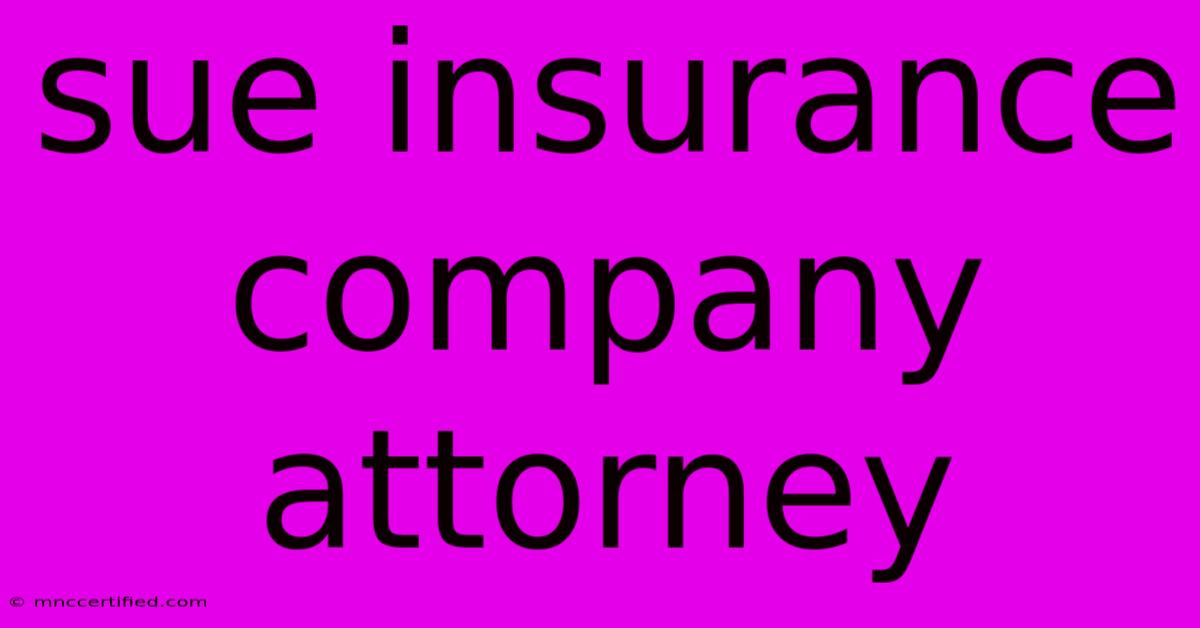Sue Insurance Company Attorney

Table of Contents
Fighting Back: Your Guide to Finding the Right Sue Insurance Company Attorney
Suing an insurance company can feel like David versus Goliath. They have vast resources and legal teams, making it a daunting task for individuals facing unfair claim denials or inadequate settlements. But you don't have to fight this battle alone. Finding the right sue insurance company attorney is crucial to protecting your rights and achieving a fair outcome. This comprehensive guide will walk you through the process of finding and working with an experienced attorney to pursue your case.
Understanding Your Options: Types of Insurance Claims and Legal Representation
Before diving into finding an attorney, it's essential to understand the specific type of insurance claim you're pursuing. Common areas where individuals need to sue insurance companies include:
-
Auto Insurance Claims: Denial of claims following accidents, disputes over liability, or insufficient coverage for injuries and property damage. Finding an attorney specializing in auto insurance litigation is crucial in these cases.
-
Homeowners Insurance Claims: Denial of claims for property damage due to fire, theft, natural disasters, or other covered events. A lawyer with expertise in homeowners insurance disputes can help navigate complex policy language and build a strong case.
-
Health Insurance Claims: Denial of medical claims, disputes over coverage, or unfair practices by health insurance providers. An attorney specializing in health insurance law will understand the intricacies of medical billing and insurance regulations.
-
Life Insurance Claims: Denial of life insurance benefits, disputes over policy terms, or issues with beneficiary designations. Life insurance litigation requires specialized knowledge of policy interpretation and beneficiary rights.
Key Qualities to Look for in a Sue Insurance Company Attorney
Choosing the right attorney is paramount to the success of your case. Look for these essential qualities:
-
Experience: Prior experience handling similar cases against insurance companies is crucial. Check their track record of successful settlements and verdicts. Look for attorneys who specifically handle insurance bad faith claims.
-
Specialization: An attorney specializing in insurance law will possess a deeper understanding of insurance policies, regulations, and litigation strategies. This specialized knowledge provides a significant advantage.
-
Reputation: Research the attorney's reputation through online reviews, bar association ratings, and testimonials from previous clients.
-
Communication: Effective communication is vital. Choose an attorney who is responsive, keeps you informed, and explains legal complexities in a way you understand.
-
Contingency Fees: Many attorneys handling these cases work on a contingency fee basis, meaning they only get paid if you win your case. This minimizes upfront financial risk. However, always clarify the fee structure upfront.
The Process: From Initial Consultation to Settlement
The process of working with a sue insurance company attorney typically involves:
-
Initial Consultation: Schedule a consultation to discuss your case, gather information, and assess your options. Many initial consultations are free.
-
Case Evaluation: Your attorney will review your insurance policy, documents related to your claim, and other relevant evidence to determine the strength of your case.
-
Negotiation: Your attorney will attempt to negotiate a fair settlement with the insurance company.
-
Litigation: If negotiation fails, your attorney may file a lawsuit on your behalf. This involves preparing and filing legal documents, conducting discovery, and potentially going to trial.
-
Settlement or Verdict: The case may conclude with a settlement reached outside of court or a verdict from a judge or jury.
Avoiding Common Mistakes When Suing an Insurance Company
-
Don't delay: Contact an attorney as soon as possible after your claim is denied or you believe you've been treated unfairly.
-
Document everything: Keep meticulous records of all communication, documents, medical records, and other relevant evidence.
-
Avoid admitting fault: Be cautious about what you say to the insurance company, both verbally and in writing.
-
Don't settle prematurely: Resist pressure to accept a low settlement offer before consulting with an attorney.
-
Understand your policy: Familiarize yourself with the terms and conditions of your insurance policy.
Finding the right sue insurance company attorney is a critical step in protecting your rights and pursuing a just outcome. By carefully considering the factors outlined above and diligently engaging with your chosen legal representative, you can significantly increase your chances of success in your fight for fair compensation. Remember, you deserve to be treated fairly, and a skilled attorney is your best ally in this process.

Thank you for visiting our website wich cover about Sue Insurance Company Attorney. We hope the information provided has been useful to you. Feel free to contact us if you have any questions or need further assistance. See you next time and dont miss to bookmark.
Featured Posts
-
Six Men Identified In Pauls Assault
Nov 27, 2024
-
Confirmed Man City Vs Feyenoord Lineups
Nov 27, 2024
-
Home Insurance Self Inspection
Nov 27, 2024
-
Italiano Insurance Boca Grande
Nov 27, 2024
-
Nov 26 Bayern Vs Psg Live Stream Guide
Nov 27, 2024